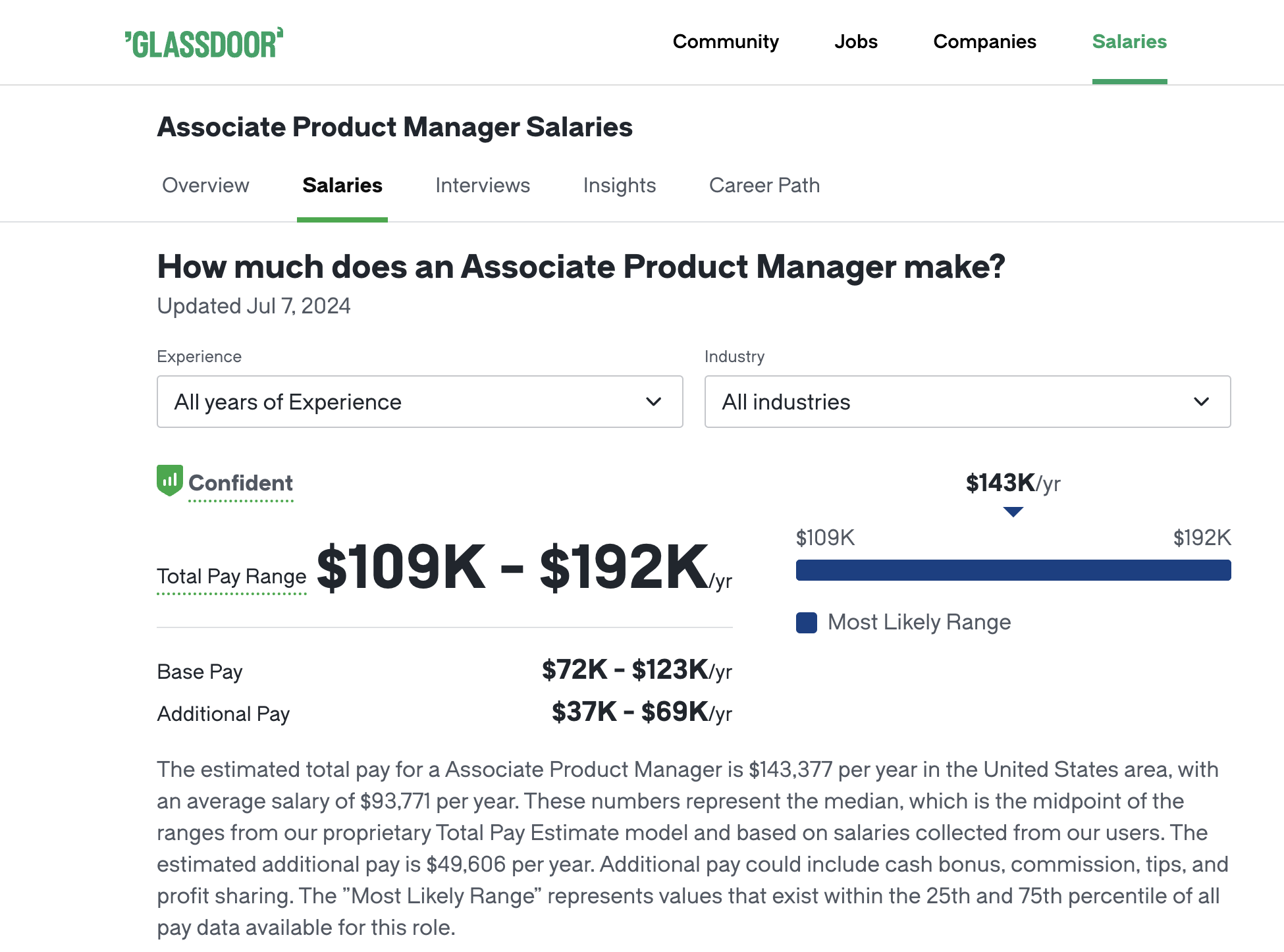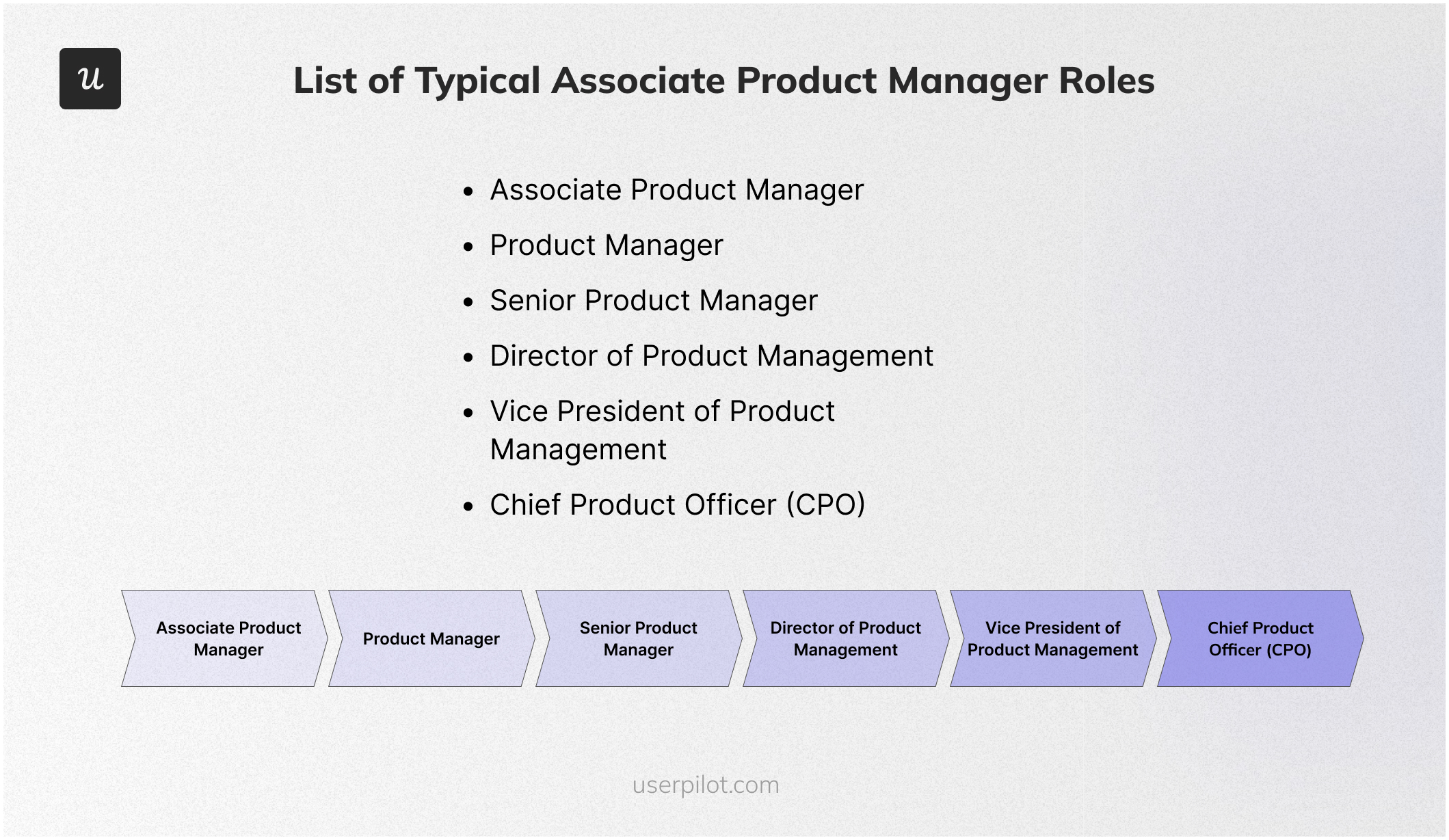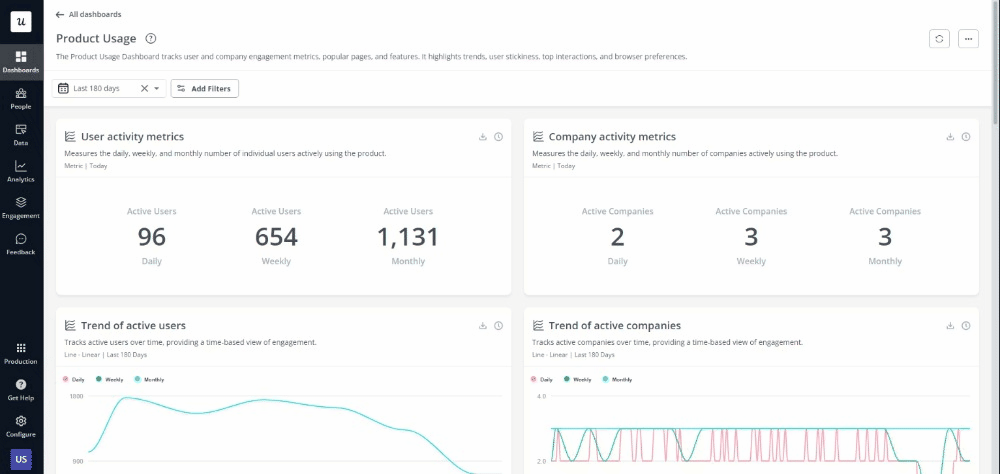![Associate Product Manager Salary [+ Resources to Advance]](https://blog-static.userpilot.com/blog/wp-content/uploads/2024/07/Associate-Product-Manager-Salary-Resources-to-Advance.png)
Associate Product Manager Salary [+ Resources to Advance]7 min read
Get The Insights!
The fastest way to learn about Product Growth, Management & Trends.
How much does an associate product manager make?
One of the biggest factors influencing your salary is your experience level. Here’s how experience can impact your associate product manager’s salary, according to Glassdoor:
- 1 to 3 years experience: $110,299/year
- 4 to 6 years experience: $112,294/year
- 7 to 9 years experience: $116,557/year
Industries with the highest demand for product professionals tend to pay the most on average. Technology, finance, healthcare, e-commerce, and consumer goods represent a significant portion of product management job openings. The average base salary for an Associate Product Manager in the United States ranges from $113,670 to $142,458, with a median of around $127,319.
Where you live can have a big impact on how much you make as an associate product manager. As more and more companies employ a geographically dispersed workforce (including remote workers), it’s common for companies to offer location-based salaries. According to Glassdoor, these are the midpoint salaries for associate product managers in the following large US cities:
- San Francisco: $123,503/year
- New York: $98,115/year
- Boston: $$94,294/year
- Washington, DC: $96,860/year
- Chicago: $93,181/year

Associate product manager career path
Here is the typical career path for an associate product manager:
- Associate Product Manager: At this initial stage, you’ll work closely with senior product managers to grasp the fundamentals of product lifecycle management. This includes participating in market research, developing product specifications, and managing minor projects. Success in this role is achieved by demonstrating a keen ability to analyze data, understanding customer feedback, and effective communication skills, which are crucial for progressing to more advanced positions.
- Product Manager: Moving up, Product Managers take full responsibility for the success of their products from conception through launch and beyond. This involves more direct involvement in setting product strategy, defining roadmaps, and leading cross-functional teams to execute these plans. To excel, you must continually improve product offerings based on user feedback and performance metrics, enhancing customer satisfaction and business outcomes.
- Senior Product Manager: At the senior level, you’ll oversee multiple product portfolios, mentor junior product managers, and make critical decisions that affect the company’s long-term product strategy. Advancement at this stage is contingent upon your ability to lead and inspire teams, manage complex product challenges, and drive significant growth and innovation within the organization.
- Director of Product Management: As a Director, your focus shifts to a broader product management strategy, including integration of customer insights into product development and alignment with business objectives. The key to success in this role is your capacity to enhance user experience and manage product lines to support the company’s market presence and profitability goals.
- Vice President of Product Management: The VP of Product Management plays a critical role in shaping the company’s product vision at the highest strategic level. Progress in this role depends on your expertise in managing and adapting to market trends, influencing product culture, and making decisions that drive the company forward in competitive and innovative ways.
- Chief Product Officer (CPO): Reaching the pinnacle of the product management career ladder, the CPO is responsible for the company’s entire product strategy. This top executive role demands a visionary approach to product development, a thorough understanding of the market, and the ability to steer the company through shifts in technology and consumer preferences, ensuring sustained business success and market leadership.

Best practices to be a great associate product manager
To excel in this role, here are some best practices that associate product managers should embrace:
- Embrace a data-driven mindset: Leverage analytics and user feedback to make informed decisions about product features, pricing, and roadmaps. Regularly analyze usage metrics and customer insights to identify improvement areas and growth opportunities.
- Stay agile and adaptable: Be prepared to pivot quickly based on market changes, customer needs, and new competitive threats. Embrace an iterative approach to product development, with frequent releases and continuous improvement.
- Prioritize user experience over anything else: Put the user at the center of every decision. Conducted user research, gathered feedback, and tested prototypes to ensure the product was intuitive and engaging and solved real customer problems. Continuously seek ways to enhance the user experience and drive customer satisfaction.
- Develop a growth mindset: Approach product management as a continuous learning process. Stay up-to-date with industry trends, best practices, and emerging technologies. Attend conferences, participate in online communities, and engage with mentors to expand your knowledge and skills. Continuously seek opportunities for professional development and personal growth.
Best resources for associate product managers
Below, we have compiled a comprehensive list of books, webinars, podcasts, and blogs specifically tailored to enhance the knowledge and skills of Associate Product Managers.
Best books for associate product managers
Starting a career in product management can be daunting, but having the right resources can make a world of difference. These books offer valuable guidance, frameworks, and real-world examples to help aspiring product managers build a strong foundation:
- “Inspired: How To Create Products Customers Love” by Marty Cagan: Practical insights on building successful products by understanding customer needs.
- “Lean Product and Lean Analytics” by Ben Yoskovitz and Alistair Croll: A guide to using data for informed product decisions.
- “The Lean Startup” by Eric Ries: Lean methodology principles for product management.
- “Cracking the PM Interview” by Gayle Laakmann McDowell and Jackie Bavaro: Advice on landing a product management role.
- “Product Management in Practice” by Matt LeMay: Practical advice on the daily responsibilities of a product manager.
Best webinars for associate product managers
Webinars provide an engaging and convenient way to learn from industry experts and stay up-to-date on the latest product management trends and techniques. Here are some of the best webinars tailored for associate product managers:
- Userpilot Webinar Series on Product Management: Industry expert-led webinars on product management.
- “Building Better Products” by Product School: Best practices in product management from experts.
- “Mastering Product Roadmaps” by Mind the Product: Strategies for effective product roadmaps.
- “Product Analytics for Better Decisions” by Mixpanel: Effective use of product analytics tools.
- “Product-Led Growth Strategies” by Userpilot: Webinars on driving growth through product-led strategies.
Best blogs for associate product managers
Blogs offer a wealth of information, from how-to guides to opinion pieces and industry news. These blogs are a great resource for associate product managers seeking to expand their knowledge and stay informed:
- Userpilot Blog: Articles on user experience and product management best practices.
- Mind the Product Blog: Insights, tips, and trends in product management.
- Product Talk by Teresa Torres: Advice on continuous discovery and customer insights.
- Product Coalition: Community-driven blog with articles on all aspects of product management.
- Roman Pichler’s Blog: Insights and advice from a leading product management expert.
Best podcasts for associate product managers
Podcasts are a fantastic way to learn while on the go, offering a wealth of knowledge and insights from experienced product professionals. Here are some of the best podcasts for associate product managers:
- “This is Product Management”: Interviews with product managers and industry leaders.
- “The Product Podcast” by Product School: Insights from top product managers and entrepreneurs.
- Userpilot’s “Product-Led Growth” Podcast: Episodes on creating customer-centric products.
- “The Product Experience”: Stories and tips from product management professionals.
- “Rocketship.fm”: Insights on startups, product management, and growth strategies.
Best tools for associate product managers
Leveraging the right tools is essential to excel as an Associate Product Manager. Here are some top tools tailored to your needs:
- Best tool for user product management – Userpilot: Enables you to track product usage, analyze user behavior, collect user feedback, and create data-driven in-app experiences.
- Best tool for project management – Monday: Facilitates task organization, progress tracking, and timely project delivery, ensuring seamless collaboration.
- Best tool for CX – Zendesk: It provides robust support and feedback management features, helping you address customer concerns promptly and enhance satisfaction.
- Best tool for customer success – ClientSuccess: It tracks customer health metrics and engagement, helping you proactively improve customer retention.
- Best tool for UX/UI design – Figma: Allows collaborative design and prototyping, ensuring intuitive and user-friendly interfaces.
- Best tool for data analytics – Tableau: It offers powerful visualization and analysis capabilities, enabling you to derive actionable insights from data.
- Best tool for collaborative documentation – Confluence: It enhances team collaboration and knowledge sharing, keeping everyone aligned on strategies and updates.
Conclusion
Now that you have a better understanding of the salary range for an associate product manager position, you can take steps to improve your earning potential.
Consider pursuing relevant certifications, developing your skillset, or negotiating effectively during the job offer stage.
Looking into tools for associate product managers? Userpilot is an all-in-one product platform with engagement features and powerful analytics capabilities. Book a demo to see it in action!








